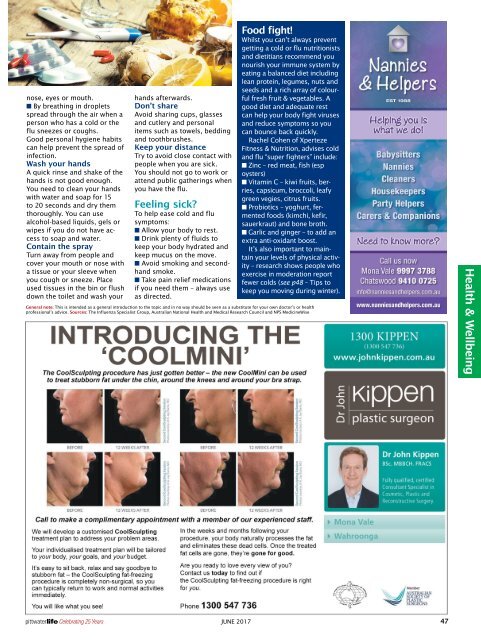Pittwater Life June 2017 Issue
Cafe Society. Exclusive Q&A: Michael Regan. Dummies Guide To The B-Line. Cash Splash.
Cafe Society. Exclusive Q&A: Michael Regan. Dummies Guide To The B-Line. Cash Splash.
Create successful ePaper yourself
Turn your PDF publications into a flip-book with our unique Google optimized e-Paper software.
nose, eyes or mouth.<br />
n By breathing in droplets<br />
spread through the air when a<br />
person who has a cold or the<br />
flu sneezes or coughs.<br />
Good personal hygiene habits<br />
can help prevent the spread of<br />
infection.<br />
Wash your hands<br />
A quick rinse and shake of the<br />
hands is not good enough.<br />
You need to clean your hands<br />
with water and soap for 15<br />
to 20 seconds and dry them<br />
thoroughly. You can use<br />
alcohol-based liquids, gels or<br />
wipes if you do not have access<br />
to soap and water.<br />
Contain the spray<br />
Turn away from people and<br />
cover your mouth or nose with<br />
a tissue or your sleeve when<br />
you cough or sneeze. Place<br />
used tissues in the bin or flush<br />
down the toilet and wash your<br />
hands afterwards.<br />
Don’t share<br />
Avoid sharing cups, glasses<br />
and cutlery and personal<br />
items such as towels, bedding<br />
and toothbrushes.<br />
Keep your distance<br />
Try to avoid close contact with<br />
people when you are sick.<br />
You should not go to work or<br />
attend public gatherings when<br />
you have the flu.<br />
Feeling sick?<br />
To help ease cold and flu<br />
symptoms:<br />
n Allow your body to rest.<br />
n Drink plenty of fluids to<br />
keep your body hydrated and<br />
keep mucus on the move.<br />
n Avoid smoking and secondhand<br />
smoke.<br />
n Take pain relief medications<br />
if you need them – always use<br />
as directed.<br />
Food fight!<br />
Whilst you can’t always prevent<br />
getting a cold or flu nutritionists<br />
and dietitians recommend you<br />
nourish your immune system by<br />
eating a balanced diet including<br />
lean protein, legumes, nuts and<br />
seeds and a rich array of colourful<br />
fresh fruit & vegetables. A<br />
good diet and adequate rest<br />
can help your body fight viruses<br />
and reduce symptoms so you<br />
can bounce back quickly.<br />
Rachel Cohen of Xperteze<br />
Fitness & Nutrition, advises cold<br />
and flu “super fighters” include:<br />
n Zinc – red meat, fish (esp<br />
oysters)<br />
n Vitamin C – kiwi fruits, berries,<br />
capsicum, broccoli, leafy<br />
green vegies, citrus fruits.<br />
n Probiotics – yoghurt, fermented<br />
foods (kimchi, kefir,<br />
sauerkraut) and bone broth.<br />
n Garlic and ginger – to add an<br />
extra anti-oxidant boost.<br />
It’s also important to maintain<br />
your levels of physical activity<br />
– research shows people who<br />
exercise in moderation report<br />
fewer colds (see p48 – Tips to<br />
keep you moving during winter).<br />
General note: This is intended as a general introduction to the topic and in no way should be seen as a substitute for your own doctor’s or health<br />
professional’s advice. Sources: The Influenza Specialist Group, Australian National Health and Medical Research Council and NPS MedicineWise<br />
Health & Wellbeing<br />
Celebrating 25 Years<br />
JUNE <strong>2017</strong> 47

















